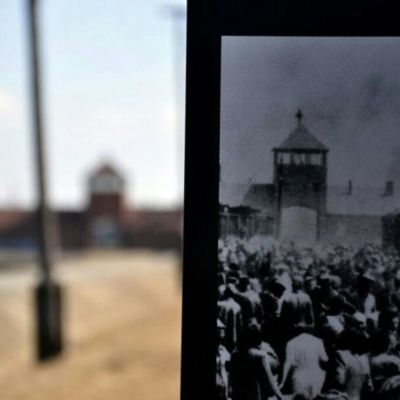The official podcast of the Auschwitz Memorial. The history of Auschwitz is exceptionally complex. It combined two functions: a concentration camp and an extermination center. Nazi Germany persecuted various groups of people there, and the camp complex continually expanded and transformed itself. In the podcast "On Auschwitz," we discuss the details of the history of the camp as well as our contemporary memory of this important and special place. We kindly ask you to support our mission and share our podcast in social media. Online lessons: http://lesson.auschwitz.org
http://www.auschwitz.org
Gesamtlänge aller Episoden: 1 day 56 minutes
episode 40: "On Auschwitz" (40): Why prisoners of Auschwitz did not start a revolt?
One of the important questions about Auschwitz is why the prisoners, who outnumbered the SS guards, did not make an attempt of a general revolt or uprising.
Dr. Piotr Setkiewicz and Dr. Wanda Witek-Malicka of the Museum Research Center discuss the first encounter of prisoners with the realities of the camp, their adaptation to the conditions of existence and the possibilities of initiating a revolt among the prisoners...
episode 41: "On Auschwitz" (41): Art at Auschwitz
The Auschwitz Memorial and Museum is in possession of the largest collection of art related to the Auschwitz camp. This collection is unique on a world scale. The artworks created in conditions of extreme danger are an extraordinary document of history and time that still stir the emotions to this day.
They enable one to discover the feelings and emotions, difficult to reconstruct today, that accompanied the inmates on a daily basis...
episode 42: "On Auschwitz" (42): Death Marches from Auschwitz towards Wodzisław Śląski and Gliwice
On January 17, 1945, SS men began the evacuation of the Auschwitz camp. Approximately 56,000 prisoners – men and women marched, under armed escort, from different parts of the Auschwitz camp complex, towards Wodzisław Śląski and Gliwice. Thousands of people, during the so-called Death Marches, lost their lives. Dr. Jacek Lachendro and Teresa Wontor-Cichy from the Research Center of the Auschwitz Museum talk about details of those tragic events...
episode 43: "On Auschwitz" (43): the film Chronicle of liberation of Auschwitz
The Auschwitz camp was liberated on January 27, 1945, by soldiers of the Red Army. Well-known are the scenes captured by Soviet cameramen, which, although not showing the exact moment of liberation, are important documents revealing the crimes committed by the Germans in Auschwitz.
It is essential to remember that some of the film material was created for propaganda purposes...
episode 44: "On Auschwitz" (44): Women at Auschwitz
The Auschwitz camp was established in June 1940 for male prisoners. The first groups of women were incarcerated by the Germans more than a year and a half later - at the end of March 1942. Dr. Wanda Witek-Malicka and Teresa Wontor-Cichy of the Museum Research Centre talk about the reasons for the creation of the women's camp in Auschwitz and the circumstances surrounding it...
episode 45: "On Auschwitz" (45): The story of Witold Pilecki, co-founder of resistance in Auschwitz
Polish soldier, Witold Pilecki was imprisoned in Auschwitz on 22 September 1940.
Pilecki undertook the mission to infiltrate the camp in order to create a conspiracy network there, organize communications, send reliable data about German crimes in the camp, and possibly prepare the camp's prisoners for a possible fight.
In April 1943, Witold Pilecki escaped with two fellow inmates...
